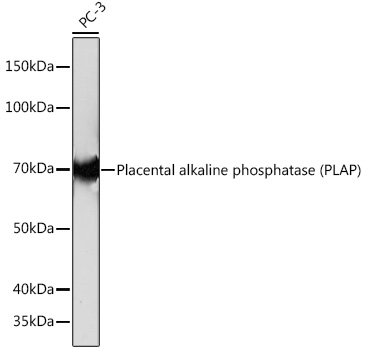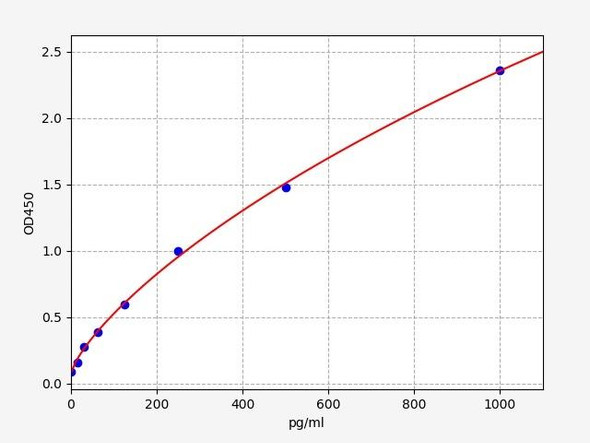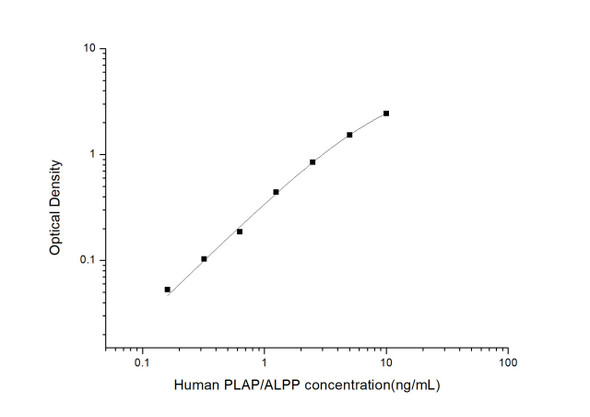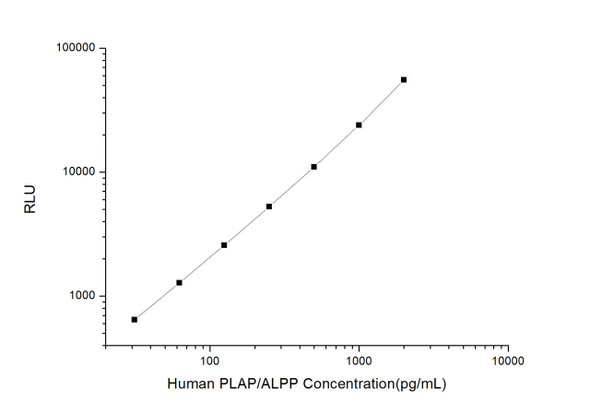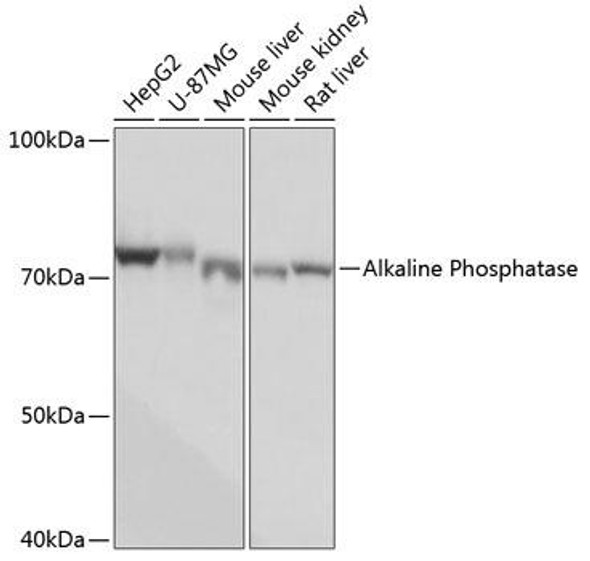Cell Biology Antibodies 17
Anti-Placental alkaline phosphatase (PLAP) Antibody (CAB4304)
- SKU:
- CAB4304
- Product Type:
- Antibody
- Reactivity:
- Human
- Reactivity:
- Mouse
- Reactivity:
- Rat
- Host Species:
- Rabbit
- Isotype:
- IgG
- Research Area:
- Cell Biology
Description
| Antibody Name: | Anti-Placental alkaline phosphatase (PLAP) Antibody |
| Antibody SKU: | CAB4304 |
| Antibody Size: | 20uL, 50uL, 100uL |
| Application: | WB IHC |
| Reactivity: | Human, Mouse, Rat |
| Host Species: | Rabbit |
| Immunogen: | A synthesized peptide derived from human Placental alkaline phosphatase (PLAP) |
| Application: | WB IHC |
| Recommended Dilution: | WB 1:500 - 1:2000 IHC 1:50 - 1:200 |
| Reactivity: | Human, Mouse, Rat |
| Positive Samples: | PC-3, Mouse testis |
| Immunogen: | A synthesized peptide derived from human Placental alkaline phosphatase (PLAP) |
| Purification Method: | Affinity purification |
| Storage Buffer: | Store at -20'C. Avoid freeze / thaw cycles. Buffer: PBS with 0.02% sodium azide, 0.05% BSA, 50% glycerol, pH7.3. |
| Isotype: | IgG |
| Sequence: | Email for sequence |
| Gene ID: | 250 |
| Uniprot: | P05187 |
| Cellular Location: | Cell membrane, GPI-anchor, Lipid-anchor |
| Calculated MW: | 70kDa |
| Observed MW: | 70KDa |
| Synonyms: | ALP, PALP, PLAP, PLAP-1 |
| Background: | The protein encoded by this gene is an alkaline phosphatase, a metalloenzyme that catalyzes the hydrolysis of phosphoric acid monoesters. It belongs to a multigene family composed of four alkaline phosphatase isoenzymes. The enzyme functions as a homodimer and has a catalytic site containing one magnesium and two zinc ions, which are required for its enzymatic function. The protein is primarily expressed in placental and endometrial tissue; however, strong ectopic expression has been detected in ovarian adenocarcinoma, serous cystadenocarcinoma, and other ovarian cancer cells. [provided by RefSeq, Jan 2015] |
| UniProt Protein Function: | ALPP: There are at least four distinct but related alkaline phosphatases: intestinal, placental, placental-like, and liver/bone/kidney (tissue non-specific). The first three are located together on chromosome 2 while the tissue non-specific form is located on chromosome 1. The product of this gene is a membrane bound glycosylated enzyme, also referred to as the heat stable form, that is expressed primarily in the placenta although it is closely related to the intestinal form of the enzyme as well as to the placental-like form. The coding sequence for this form of alkaline phosphatase is unique in that the 3' untranslated region contains multiple copies of an Alu family repeat. In addition, this gene is polymorphic and three common alleles (type 1, type 2 and type 3) for this form of alkaline phosphatase have been well characterized. [provided by RefSeq, Jul 2008] |
| UniProt Protein Details: | Protein type:Cell surface; Membrane protein, integral; Cofactor and Vitamin Metabolism - folate biosynthesis; Phosphatase (non-protein); Motility/polarity/chemotaxis; Membrane protein, GPI anchor; EC 3.1.3.1 Chromosomal Location of Human Ortholog: 2q37 Cellular Component: cell surface; plasma membrane; integral to membrane Molecular Function:zinc ion binding; alkaline phosphatase activity; magnesium ion binding Biological Process: dephosphorylation |
| NCBI Summary: | There are at least four distinct but related alkaline phosphatases: intestinal, placental, placental-like, and liver/bone/kidney (tissue non-specific). The first three are located together on chromosome 2 while the tissue non-specific form is located on chromosome 1. The product of this gene is a membrane bound glycosylated enzyme, also referred to as the heat stable form, that is expressed primarily in the placenta although it is closely related to the intestinal form of the enzyme as well as to the placental-like form. The coding sequence for this form of alkaline phosphatase is unique in that the 3' untranslated region contains multiple copies of an Alu family repeat. In addition, this gene is polymorphic and three common alleles (type 1, type 2 and type 3) for this form of alkaline phosphatase have been well characterized. [provided by RefSeq, Jul 2008] |
| UniProt Code: | P05187 |
| NCBI GenInfo Identifier: | 94721246 |
| NCBI Gene ID: | 250 |
| NCBI Accession: | NP_001623.3 |
| UniProt Secondary Accession: | P05187,P05188, P06861, Q53S78, Q96DB7, |
| UniProt Related Accession: | P05187 |
| Molecular Weight: | 57,954 Da |
| NCBI Full Name: | alkaline phosphatase, placental type preproprotein |
| NCBI Synonym Full Names: | alkaline phosphatase, placental |
| NCBI Official Symbol: | ALPP |
| NCBI Official Synonym Symbols: | ALP; PALP; PLAP; PLAP-1 |
| NCBI Protein Information: | alkaline phosphatase, placental type; Regan isozyme; glycerophosphatase; alkaline phosphomonoesterase; placental alkaline phosphatase 1; alkaline phosphatase Regan isozyme |
| UniProt Protein Name: | Alkaline phosphatase, placental type |
| UniProt Synonym Protein Names: | Alkaline phosphatase Regan isozyme; Placental alkaline phosphatase 1 |
| Protein Family: | Phosphatase |
| UniProt Gene Name: | ALPP |
| UniProt Entry Name: | PPB1_HUMAN |
View AllClose


